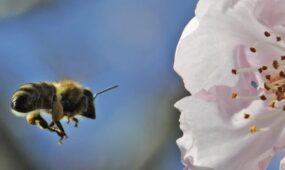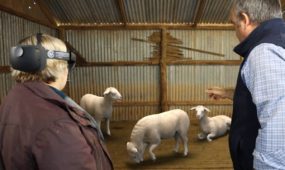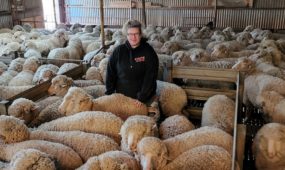Australian alpacas fuel Chinese industry
Primary Industries
CHINESE clothing manufacturers are turning to South Australia to help fuel its booming alpaca industry.

Sign up to receive notifications about new stories in this category.
Thank you for subscribing to story notifications.
The Chinese alpaca population has risen significantly over the past decade from almost zero to more than 3000.
Exports of Australian alpaca fleeces have been strong in recent years and now Chinese demand for live animals to boost their own herds is on the rise.
Australian alpacas were used as seed animals to build a local industry in China with recent shipments of 525 and 600 head having made their way to the Far East in the past two years.
Alpaca fleece has become a coveted premium material that is used in many luxury winter clothes and bedding around the world.
It is a multi-million dollar business and the cost of a single animal can range between AUD $350 and $60,000 depending on the colour of its coat, its fleece quality and its breeding history.
Very fine (
Ambersun Alpacas is a breeding farm about 55 km south of Adelaide, South Australia’s capital. It has one of the largest herds outside of South America.
Owners Adrienne Clarke and her husband Chris Williams were recently invited by the Local Government Association of South Australia to showcase their business in China.
The couple also presented at seminars on the trip to promote the Australian industry.
Clarke said her herd’s fleeces were considered to be among the best quality in the world.
“The quality of alpacas in Australia is quite high because we have a long history of breeding animals that produce fibre,” she said.
“China has looked to Australia for alpacas both because of quality and the strict health standards that our Government has.
“We have a strong focus on the production of the fibre and if the interest is primarily to develop herds of alpacas then we can satisfy the market there.”
Clarke and her husband have been involved with exporting fleece to China in the past but are looking to export whole animals in the near future.
China has strict bio-security concerns much like Australia, which makes Ambersun a more attractive source of alpacas than many South American operations.
Alpaca fleece is similar to cashmere in its texture and softness but is a more durable fibre.
Peru is home to more than 3.5 million alpacas, which makes up about 80 per cent of the global herd.
There are now more than 170,000 alpacas in Australia.
Clarke said Ambersun had previously exported alpacas to Europe where the fibre was not only used to manufacture clothing but also used in hospitals to help treat injuries.
“Last year we exported some of our premium range fleece to Norway and they are being used in medical supplies to make elasticised bandaging that goes underneath casts,” she said.
“It is difficult for manufacturers of this product to source the material anywhere else in the world.”
Alpacas are also known for their high protein meat that is strong in iron and low in fat.
The meat is mild in flavour but is highly regarded as a healthy alternative to other meat products.
South Australian President of the Australian Alpaca Association Perry Wheeler said he expected to see a restructuring of Australian alpaca farms to cater to the booming Chinese market.
“People love to make coats, sweaters, and quilts. The fibre is wonderful for that,” he said.
“The best part is you can use an alpaca for eight or nine years and then they can be transferred to the meat market with no loss of quality at all.
“Now that we are starting to get a large number in Australia, we’re moving away from a very niche industry to a more agricultural one.”
Jump to next article



